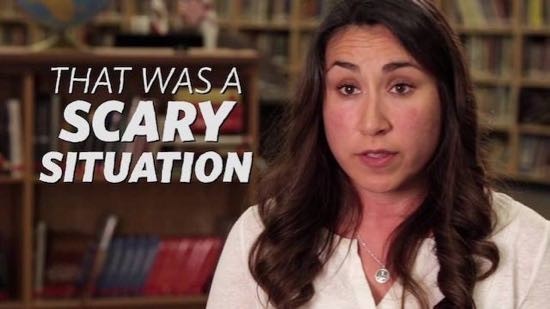Is Your School Teaching Digital Citizenship?

Help Your School Teach Digital Citizenship
Today's kids are impressively tech-savvy. But the digital world — just like the non-digital world — requires all kinds of skills that kids don't simply pick up as they go.
 Erin Wilkey Oh
Erin Wilkey OhDigital citizenship and media literacy have to be taught and modeled by the adults in kids' lives. How do kids tell the difference between trustworthy and false information on the web? What should they do if they witness cyberbullying? How do they keep their personal information private online?
Every day in the classroom — especially in schools with lots of technology — teachers can help kids build these essential skills. But teachers are incredibly busy and often overwhelmed by all they're expected to accomplish each day.
Though they may want to teach digital citizenship and media literacy, fitting these lessons into an already packed agenda can be a struggle.

Five ways parents can start the conversation
- Talk to your child’s teacher. Find out what your teacher is already doing to build these skills, and share a few of the resources in this blog. Common Sense Education’s K–12 Digital Citizenship Curriculum has ready-made lessons and videos designed to help teachers fit digital citizenship activities into their existing instruction. Designed and developed in partnership with Project Zero at the Harvard Graduate School of Education — and guided by research with thousands of educators — each digital citizenship lesson takes on real challenges and digital dilemmas that students face today.
- Get to know the school librarian. The media center is often the hub for all digital citizenship and media-literacy lessons. Find out if the school librarian is addressing these topics regularly. Introduce the librarian to interactive student games on digital citizenship, which allow kids to explore and discuss the impact of their decisions in the digital world.
- Share family resources with other parents. Raise awareness about balanced media use at home by sharing our K–12 Family Media Agreement and Device-Free Dinner initiative with other parents and caregivers in your school community. Your teacher can also help get parents on board with these strategies. As more families buy into digital citizenship, it will be easier to convince the school to follow suit.
- Engage your PTA. Spark a community conversation with Common Sense Media’s Presentations for Parents and Families. These slide presentations give PTA leaders or school staff members an easy way to address the most pressing parent concerns related to kids' digital lives. Families will get the latest research, expert advice, tips, and recommendations to help them face these challenges with confidence.
- Connect with the principal. They may seem too busy, but school principals want to know more about your priorities for your kid's education. They're also always on the lookout for quality learning opportunities for their teachers. Share with your principal Common Sense Education's webinars, teaching videos, and digital citizenship training for ways to get teachers up to speed on teaching these essential skills.
Digital Citizenship Week
The California Department of Education, in collaboration with Common Sense Education and the California State legislature, celebrates Digital Citizenship Week October 15-19, 2018. These lessons can be used year-round.
 Erin Wilkey Oh is Executive Director, Education Content and Distribution for Common Sense Education. Erin’s work has focused on supporting K-12 students and teachers for over a decade. As executive editor of education content for Common Sense, she provides teachers with practical tips and strategies for using classroom technology, and helps students use media productively to become critical thinkers and creators.
Erin Wilkey Oh is Executive Director, Education Content and Distribution for Common Sense Education. Erin’s work has focused on supporting K-12 students and teachers for over a decade. As executive editor of education content for Common Sense, she provides teachers with practical tips and strategies for using classroom technology, and helps students use media productively to become critical thinkers and creators.
Tags on this post
Bullying Character Education School Climate TechnologyAll Tags
A-G requirements Absences Accountability Accreditation Achievement gap Administrators After school Algebra API Arts Assessment At-risk students Attendance Beacon links Bilingual education Bonds Brain Brown Act Budgets Bullying Burbank Business Career Carol Dweck Categorical funds Catholic schools Certification CHAMP Change Character Education Chart Charter schools Civics Class size CMOs Collective bargaining College Common core Community schools Contest Continuous Improvement Cost of education Counselors Creativity Crossword CSBA CTA Dashboard Data Dialogue District boundaries Districts Diversity Drawing DREAM Act Dyslexia EACH Early childhood Economic growth EdPrezi EdSource EdTech Education foundations Effort Election English learners Equity ESSA Ethnic studies Ethnic studies Evaluation rubric Expanded Learning Facilities Fake News Federal Federal policy Funding Gifted Graduation rates Grit Health Help Wanted History Home schools Homeless students Homework Hours of opportunity Humanities Independence Day Indignation Infrastructure Initiatives International Jargon Khan Academy Kindergarten LCAP LCFF Leaderboard Leadership Learning Litigation Lobbyists Local control Local funding Local governance Lottery Magnet schools Map Math Media Mental Health Mindfulness Mindset Myth Myths NAEP National comparisons NCLB Nutrition Pandemic Parcel taxes Parent Engagement Parent Leader Guide Parents peanut butter Pedagogy Pensions personalized Philanthropy PISA Planning Policy Politics population Poverty Preschool Prezi Private schools Prize Project-based learning Prop 13 Prop 98 Property taxes PTA Purpose of education puzzle Quality Race Rating Schools Reading Recruiting teachers Reform Religious education Religious schools Research Retaining teachers Rigor School board School choice School Climate School Closures Science Serrano vs Priest Sex Ed Site Map Sleep Social-emotional learning Song Special ed Spending SPSA Standards Strike STRS Student motivation Student voice Success Suicide Summer Superintendent Suspensions Talent Teacher pay Teacher shortage Teachers Technology Technology in education Template Test scores Tests Time in school Time on task Trump Undocumented Unions Universal education Vaccination Values Vaping Video Volunteering Volunteers Vote Vouchers Winners Year in ReviewSharing is caring!
Password Reset
Search all lesson and blog content here.
Login with Email
We will send your Login Link to your email
address. Click on the link and you will be
logged into Ed100. No more passwords to
remember!














Questions & Comments
To comment or reply, please sign in .